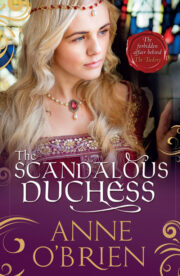‘Well, he has gone,’ Countess Joan observed as she caught up with me later in the morning. It was becoming time for me to leave also. ‘Was it very painful?’
‘No,’ I lied. I managed to smile. ‘Your chaperonage was wasted, I fear. Our desire to leap into each other’s arms is a thing of the past. There is no impropriety.’ I touched her hand in thanks. ‘The Duke’s infatuation is dead.’
She tilted her head.
‘Do you say? I saw a man on the edge of control. If you had stayed, you would have seen him spurring his horse away towards London as if the Devil was breathing fire on his heels. Did nothing pass between you?’
‘Nothing. What had I to say to him, or he to me?’ I forced my brows to rise in a magnificent imitation of disbelief at what she might imply. ‘I think the death of the child would light such a fire,’ I responded gravely. ‘He cares very much for Henry—and for Mary. I see no connection with me.’
Countess Joan eyed me for a long moment.
‘It’s not what I see—but perhaps you are right. Who’s to say? And what of your long infatuation, Kate? Is that too dead?’
But that was a question too far. I would not answer.
I could not.
I was no longer certain of anything.
Chapter Sixteen
‘Heard what?’
My servant barely had time to open the door of my rented property in answer to the thud of an urgent fist. The Dean of Lincoln Cathedral stood on my doorstep, black-clad like a bird of ill-omen, a look of horror dragging at his thin features.
‘Come in, sir.’ Such was the hammering that I was at my servant’s shoulder. ‘Are you ill?’
‘No, my lady. I mean, yes—I will come in.’ He stumbled on the paving. ‘It’s bad news.’
‘Then you must tell me.’ I took the Dean’s arm and led him through to the comfortable setting of one of the Chancery’s spacious parlours. ‘Sit there and tell me what troubles you.’
The Dean enjoyed being the purveyor of bad news, mostly no more than some wild behaviour in the town that had encroached on the Cathedral Close. Today I was aware of no such disturbance yet still was pleased to extend my hospitality.
Unable to settle at Kettlethorpe after my sojourn at Rochford Hall, I had taken Agnes and the children to Lincoln, renewing my renting of the Chancery from the Dean and Chapter of the Cathedral.
Lincoln. My life in the very centre of that busy town over the years was as much of a pleasure as I could hope for.
The Chancery offered me a comfortable property well suited to my standing, providing me with a great chamber, perfect for entertaining visitors, my own private chapel and a solar on the first floor, a well-proportioned room where I slept and lived out my private life. With its carved doorways, immaculate stabling, courtyard and gardens full of fruit trees, its sophistication suited my state of mind. I had made a new life for myself in Lincoln. I was not without resources.
Three years had passed since the Duke’s blistering temper at Rochford Hall and my stiff-necked intransigence. Three years in which I was free to reconsider the Duke’s motives. If he had wished, by the quitclaim, to deflect Walsingham and his ilk, he had succeeded, for I was left alone, but of course, I would never know. There was no longer communication between us.
Perhaps for me the pain of living alone had grown numb. I liked to think so and gave a fair imitation of tolerance of our parting. My love for the Duke, my memories of our life together, had faded as all things fade with the passage of time.
‘Tell me, sir,’ I encouraged now. The Dean gulped the wine I poured and handed to him. ‘You said it was bad news,’ I prompted.
‘Yes, my lady. The worst.’ He leaned forward, his voice tinged with awe. ‘The assassination of the Duke of Lancaster.’
My lips parted.
My fingers gripped my own cup.
My mind was frozen.
Misinterpreting my silence: ‘Perhaps you already knew, my lady?’
I shook my head, utterly speechless.
He was dead. The Duke was dead.
My face felt clammy and pale.
Oblivious, the Dean launched into the facts of the plot to rid the King of his overbearing uncle, while I struggled not to be submerged in absolute despair. What would the Dean think if I fell to my knees before him and buried my face in my hands? Instead, I sat upright. It was a surprise to no one, the Dean observed, relations between the Duke and King Richard being as they were at a perilously low ebb—they had been for many months, since Richard fell under the influence of Robert de Vere. The royal favourite desired control of royal power, did he not? Nor was the King averse to escaping permanently the severity of the lectures on good government from his royal uncle. De Vere’s plot was to have the Duke killed at a tournament.


"The Scandalous Duchess" отзывы
Отзывы читателей о книге "The Scandalous Duchess". Читайте комментарии и мнения людей о произведении.
Понравилась книга? Поделитесь впечатлениями - оставьте Ваш отзыв и расскажите о книге "The Scandalous Duchess" друзьям в соцсетях.